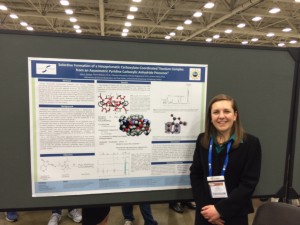American Chemical Society Conference – by Julie Fenton
March 21st, 2014I recently had the privilege of attending the national meeting of the  (ACS), held in Dallas, Texas from March 16-19. This experience was made possible in part by an SGA Professional Grant, sponsored by the Messiah College Career Center. ACS is the premiere professional development organization for chemists in the United States; though many regional meetings and gatherings are held each year, the spring national meeting is the largest and most significant gathering for chemists nation-wide. For an undergrad, attendance at this meeting is critical for developing connections with others in the field, for securing internships and research positions, and for presenting original research projects.
(ACS), held in Dallas, Texas from March 16-19. This experience was made possible in part by an SGA Professional Grant, sponsored by the Messiah College Career Center. ACS is the premiere professional development organization for chemists in the United States; though many regional meetings and gatherings are held each year, the spring national meeting is the largest and most significant gathering for chemists nation-wide. For an undergrad, attendance at this meeting is critical for developing connections with others in the field, for securing internships and research positions, and for presenting original research projects.
At the conference, I presented a poster on my own original research project. Attendance at this conference and the presentation of my work was the culmination of 12 weeks of full-time research I conducted last summer through a National Science Foundation international Research Experience for Undergraduates (NSF iREU) in the Laboratoire de Chimie Moléculaire de l’Etat Solide at the Université de Strasbourg in Strasbourg, France. My project, entitled Selective Formation of a Hexaprismatic Carboxylato-Coordinated Titanium Complex from an Asymmetric Pyridine Carboxylic Anhydride Precursor, focused on the synthesis and characterization of novel titanium-containing hybrid materials. It was remarkably successful, and I was able to realize all of the project objectives during my summer project (a rarity in the cutting edge of research science). My work has since been published in the European Journal of Inorganic Chemistry. At the ACS meeting, my poster on this project was presented in two sessions: one specifically for inorganic chemistry at the undergraduate level, the other in a professional-level poster session. At the poster sessions in which I presented, I was able to network and share my research with numerous other chemists. I made connections with other undergraduate chemists, graduate students, and numerous professionals in the field. As I enter graduate school in the fall and select a group to do research with, these connections will be invaluable to me. Additionally, it was productive to receive feedback on my project from others doing similar work.
When I wasn’t presenting my own research, I was able to benefit from listening to research presentations by others. At a meeting of this size (more than 6,000 individuals were in attendance), there were practically countless research talks to attend. I have been accepted to four Ph.D. programs to begin in the fall of 2014, and plan to study materials-inorganic chemistry. As I make my decision as to where to pursue this degree, the professors and research groups at each institution are critical: the more that I know about each group and the projects that they are working on, the better informed I will be in making my final decision. Many of these professors and their graduate students gave talks on their current research, and by attending these talks, I was able to interface with them and to hear more about their work. From the sessions I attended, I was exposed to much of the cutting-edge research in inorganic and materials chemistry. I was overwhelmed by the scope of current technology and the progress of research in chemistry, as well as the applications that many of these avenues of research could hold in the near future. By attending this meeting, I have been able to contextualize the research being done by the groups I am interested in (and by many others).
I am so thankful for the opportunity to attend this meeting. I look forward to applying all that I’ve learned to enhance my chemical knowledge as my time at Messiah ends and as I move on to continuing my education next fall.